MD Anderson Collaborates with Concord Medical to Discuss New Strategies in Cancer Treatment | 2024 Guangdong-Hong Kong-Macao Greater Bay Area International Oncology Forum Successfully Concludes
The 2024 Guangdong-Hong Kong-Macao Greater Bay Area International Oncology Forum was successfully held online on November 2-3, 2024. The event was academically supported by MD Anderson Cancer Center, organized by Concord Medical Group, and co-hosted by Guangzhou Concord Cancer Center and Shanghai Concord Cancer Center (under construction).
The forum featured ten leading experts from MD Anderson Cancer Center, who provided groundbreaking academic lectures on various fields, including lung cancer, breast cancer, radiotherapy, nursing, and more. These sessions presented cutting-edge perspectives and offered international insights. Additionally, more than ten top domestic oncology experts joined the discussions, sharing their expertise on updates to medical service concepts in the new era, and exploring clinical practices integrating innovative technologies and new drugs, such as artificial intelligence, stereotactic ablation, antibody-drug conjugates, and proton therapy.
The forum officially commenced under the chairmanship of Professor Qian Chaonan, President of Guangzhou Concord Cancer Center. Professor Deborah A. Kuban, Vice President of MD Anderson Cancer Center, and Dr. Yang Jianyu, Chairman of Concord Medical Group, delivered the opening remarks for the conference.
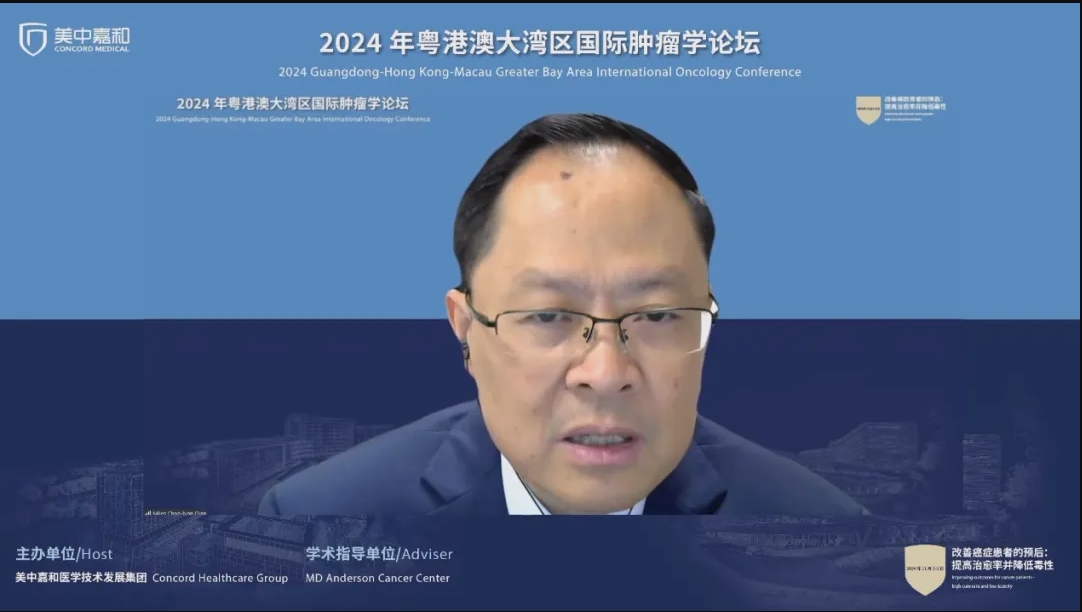
Professor Qian Chaonan
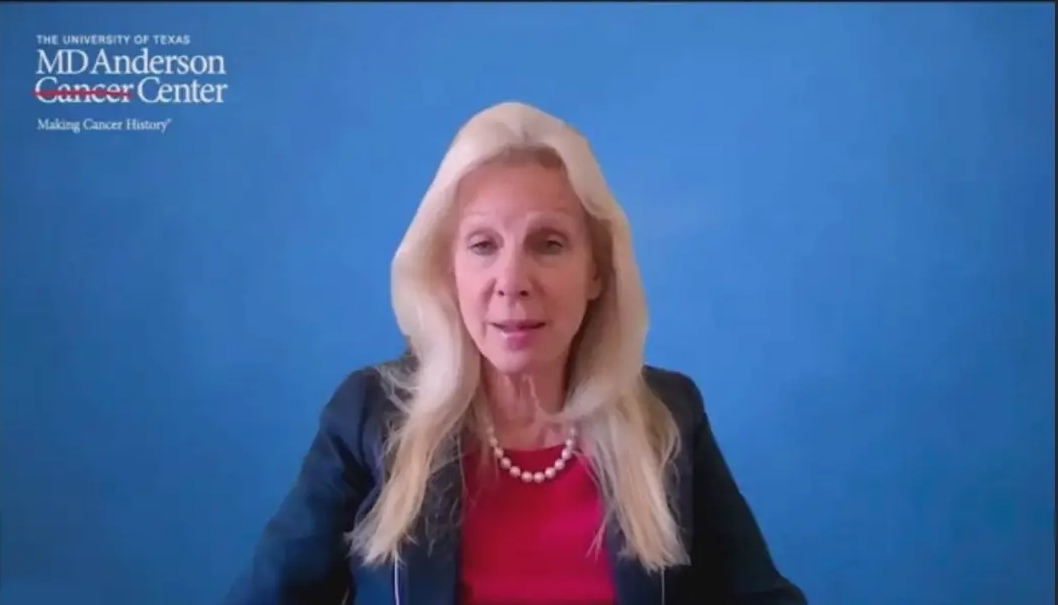
Professor Deborah A. Kuban
Professor Deborah A. Kuban stated that the conference focuses on hot topics of mutual concern for both doctors and patients, covering multidisciplinary advancements in the diagnosis and treatment of lung cancer and breast cancer, the latest developments in various treatment methods, and strategies for optimizing treatment plans. Both MD Anderson Cancer Center and Concord Medical are committed to providing the highest quality medical services, improving cancer cure rates, and minimizing the impact of treatment on patients. She hopes that the forum will inspire more innovative ideas and practices.
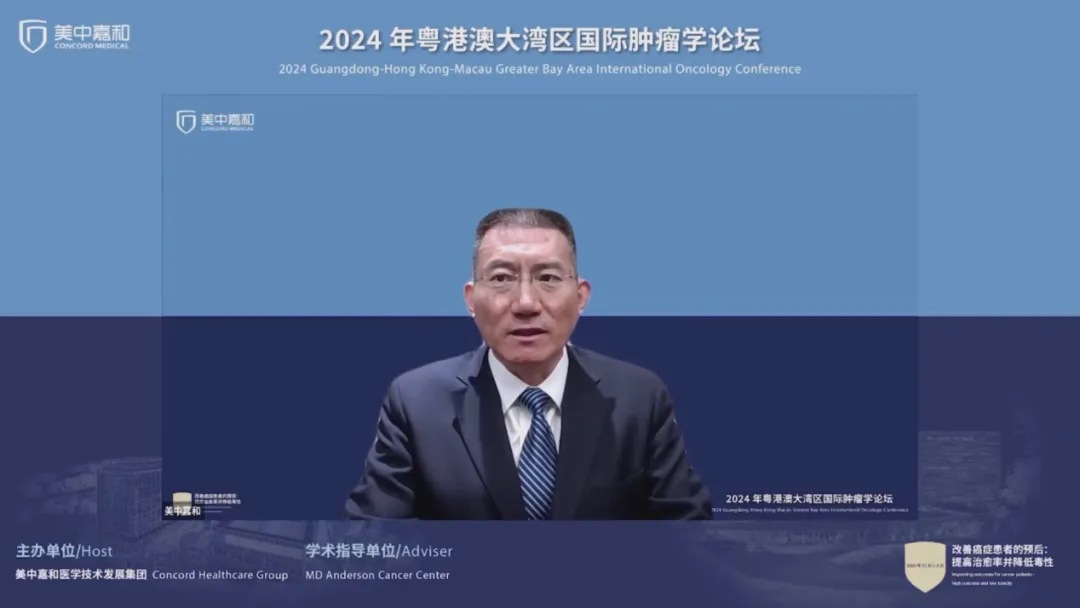
Dr. Yang Jianyu
Dr. Yang Jianyu pointed out that the theme of this forum, "Improving Cancer Patient Prognosis: Enhancing Cure Rates and Reducing Treatment Toxicity," is both challenging and profoundly meaningful. It concerns the lives of patients and is a mission and responsibility for healthcare professionals. In today’s globalized context, achieving this goal requires the power of collaboration and innovation. He looks forward to international cooperation to provide comprehensive support for patients.
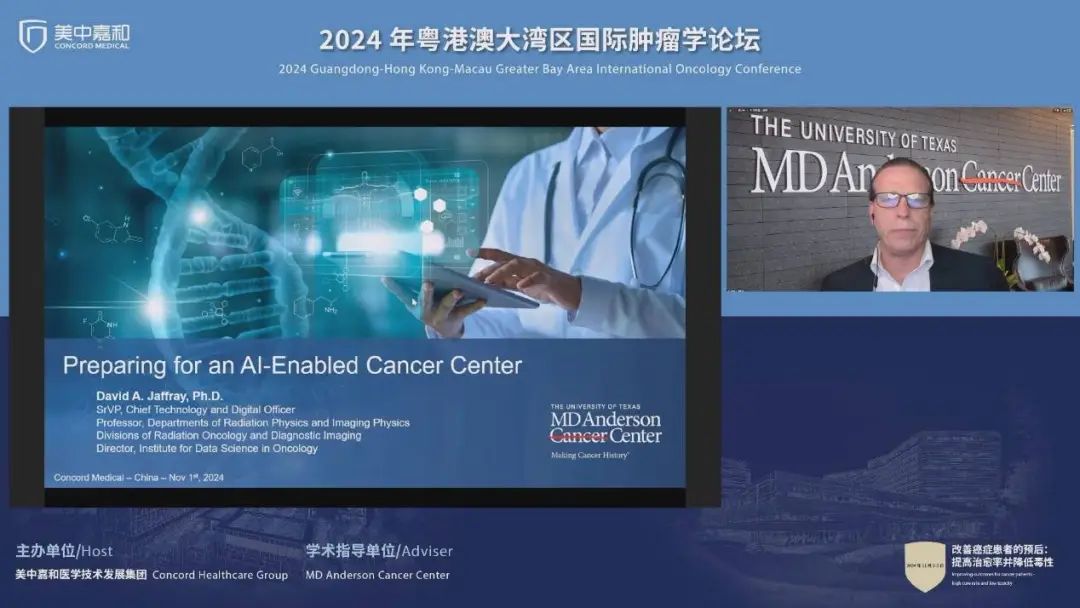
Professor David A. Jaffray
Artificial intelligence (AI) is a hot topic in today’s technological development, with some even referring to its progress as the Fourth Industrial Revolution. In his keynote speech on the application of AI in the healthcare sector, Professor David A. Jaffray from MD Anderson Cancer Center shared his insights.
Professor Jaffray emphasized that we are entering an era where computing, measurement, and data management capabilities are rapidly evolving. Clinical practice will be significantly impacted by AI, and in the medical field, it is essential to harness these new technologies to enhance technical management skills, improve data management capabilities, and support clinical decision-making. This will help in making informed long-term plans and managing patients effectively, ultimately benefiting the patients themselves.
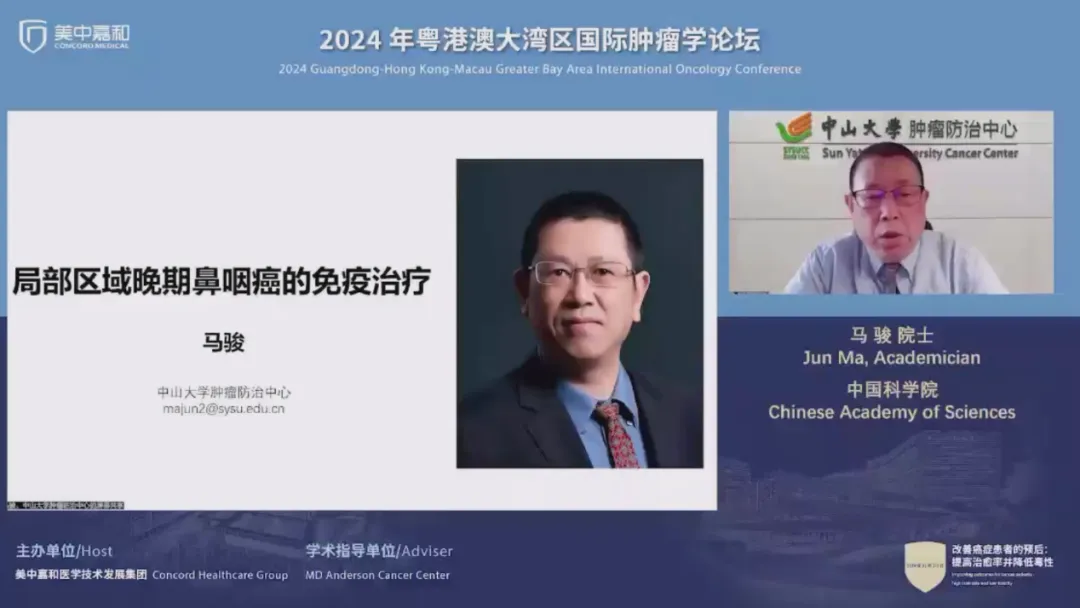
Academician Ma Jun
Academician Ma Jun, a leading expert in nasopharyngeal cancer with significant international influence, is an academician of the Chinese Academy of Sciences and the Executive Deputy Director of the Cancer Prevention and Treatment Center at Sun Yat-sen University. Over the years, he has dedicated himself to the prevention and treatment of nasopharyngeal cancer and has actively explored the application of novel therapeutic methods.
Academician Ma shared the findings of his research on immunotherapy in locally advanced nasopharyngeal cancer. Based on the synergistic mechanisms between immunotherapy and radiotherapy/chemotherapy, he led the Phase III clinical trials — the CONTINUUM study and the DIPPER study — which investigated the combination of PD-1 inhibitors with chemoradiotherapy for locally advanced nasopharyngeal cancer. These studies strongly supported the use of sintilimab or toripalimab combined with chemoradiotherapy in high-risk patients with locally advanced nasopharyngeal cancer, significantly reducing the risks of distant metastasis and local recurrence.
Lung cancer is the most prevalent and deadliest malignancy globally, and the application of innovative technologies and new drugs in the field has made significant progress in recent years. As a key topic of the conference, several experts shared new technologies, concepts, and breakthroughs in the diagnosis and treatment of lung cancer, covering early-stage, locally advanced, and advanced-stage patients. Experts from both China and the United States brought unique perspectives to the field of lung cancer treatment, making it one of the hottest topics of the forum.
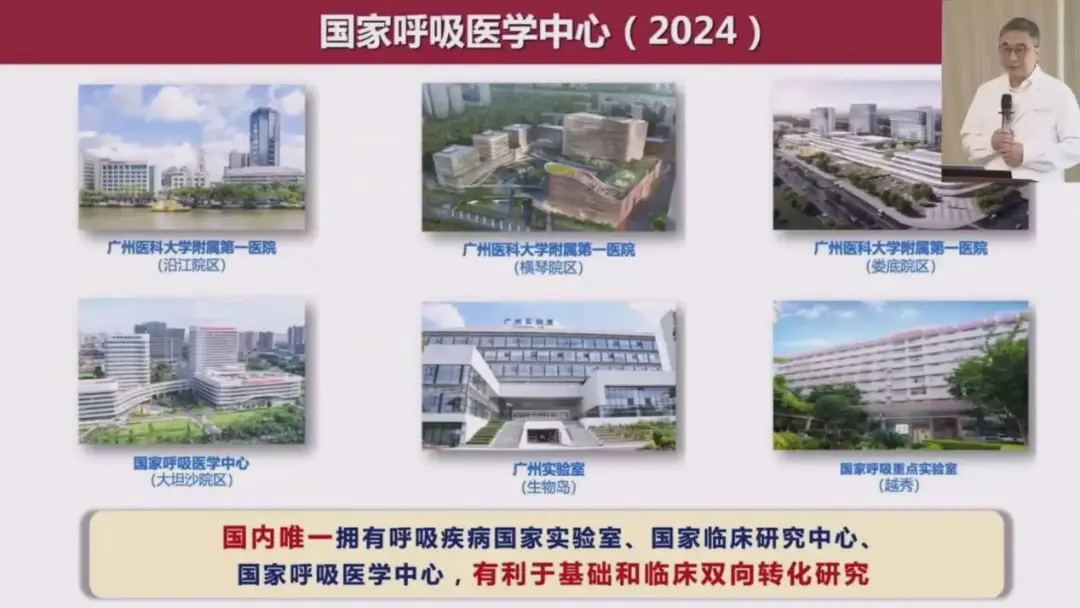
Professor He Jianxing
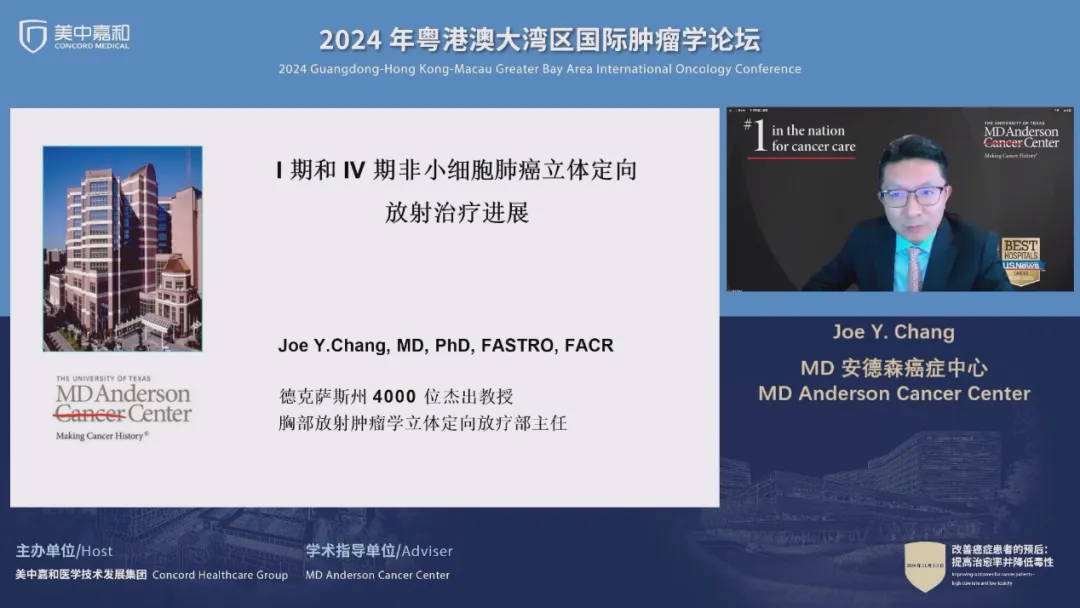
Professor Joe Y. Changg
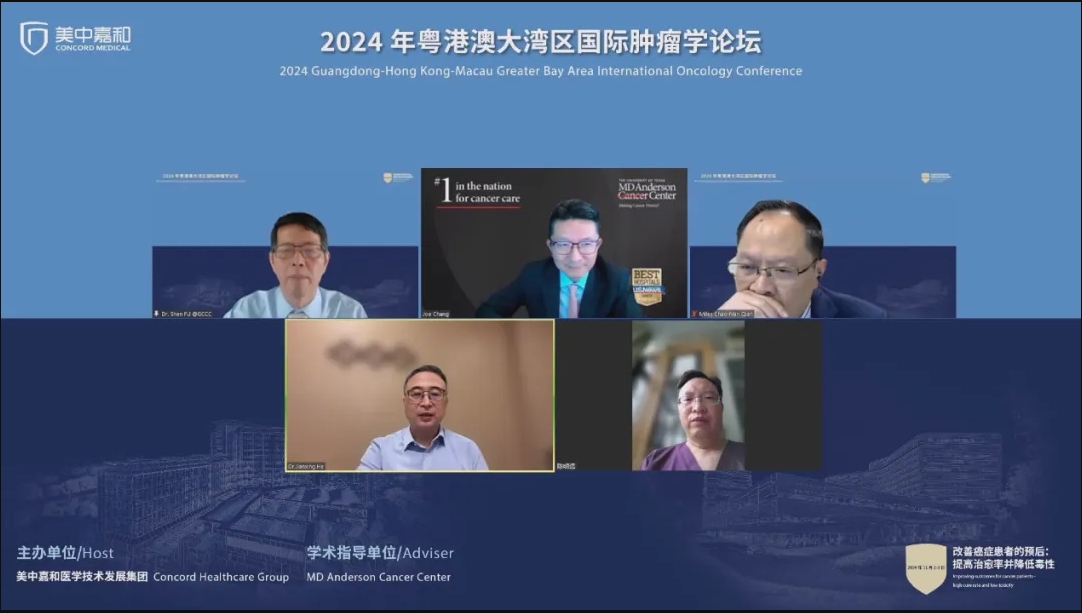
Professor He Jianxing from the First Affiliated Hospital of Guangzhou Medical University, Professor Joe Y. Chang from MD Anderson Cancer Center, Professor Zhang Li from the Cancer Prevention and Treatment Center of Sun Yat-sen University, Professor Danielle Fournier from MD Anderson Cancer Center, Professor Zhao Yuanyuan from the Cancer Prevention and Treatment Center of Sun Yat-sen University, and Professor Wang Zhijie from the Cancer Hospital of the Chinese Academy of Medical Sciences all shared the latest academic research progress related to lung cancer.
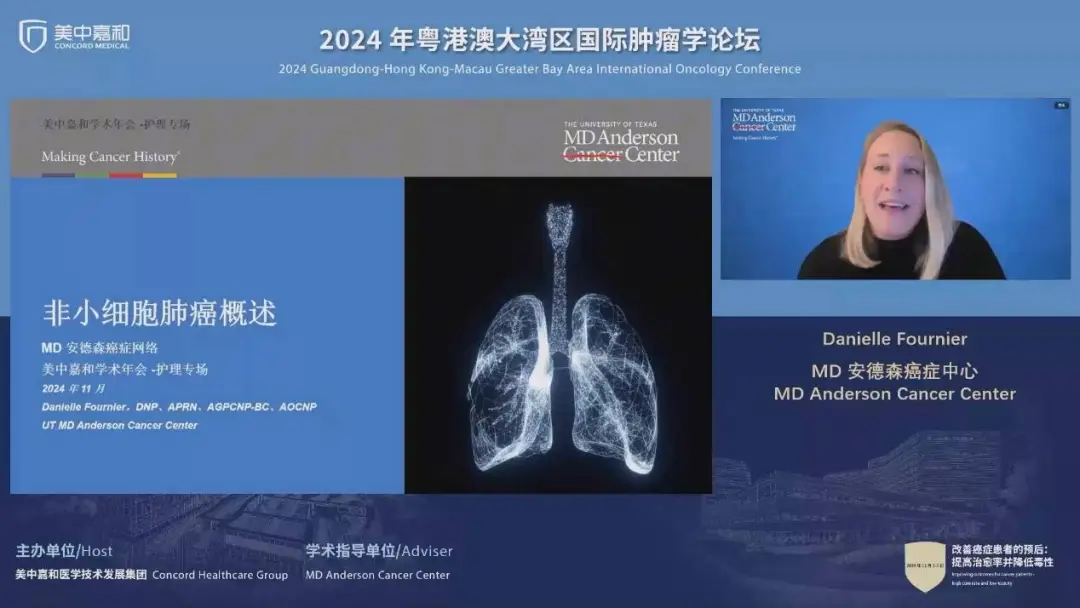
Danielle Fournier
Professor He Jianxing pointed out that early-stage NSCLC (non-small cell lung cancer) has entered the era of precision treatment. As a highly heterogeneous disease, precision-guided treatments based on precise detection have significantly improved patients' overall survival rates. By combining individual patient conditions with biomarker test results, personalized multidisciplinary treatment plans can be selected, leading to better treatment outcomes.
Professor Joe Y. Chang mentioned that both early and advanced-stage NSCLC can benefit from stereotactic ablative radiotherapy (SABR). For early-stage patients, SABR offers a non-invasive alternative with similar efficacy to surgery. When combined with immunotherapy, SABR can further significantly prolong the patient's event-free survival. For advanced-stage patients, future research needs to further optimize dosage, treatment plans, and explore more individualized combination therapies.
Bispecific antibodies have become a hot development area in NSCLC in recent years. Professor Zhang Li pointed out that bispecific antibodies have advantages over single-target antibody drugs. The multiple cross-linking effects of more and stronger target combinations on immune cells and disease targets can lead to better therapeutic outcomes. Currently, several bispecific antibodies, such as Tarlatamab, Evanthitamab, and Ivosidenib, have been approved, and future clinical research on bispecific antibodies will be more challenging.
Professor Zhao Yuanyuan shared strategies for the safe management of targeted therapies and chemotherapy, while emphasizing that immunotherapy is also a crucial treatment method for NSCLC. Professor Wang Zhijie stressed the importance of managing immune-related adverse events (irAEs) during treatment. irAEs can affect various organs and occur over extended periods, but most irAEs are reversible. Effective management requires a five-step process: prevention, assessment, examination, treatment, and monitoring. Mastery of strategies for managing skin toxicity, pulmonary toxicity, hepatotoxicity, thyroid dysfunction, myocarditis, and other irAEs is essential. The publication of the Chinese Expert Consensus on the Management of Adverse Reactions Related to Immune Checkpoint Inhibitors will provide crucial support for managing irAEs.
Breast cancer is a highly prevalent malignancy among women globally. The diagnosis and treatment of breast cancer also emphasize precision and individualization. How to ensure long-term survival for patients while further improving their quality of life has become a key topic of focus for clinicians in clinical management.
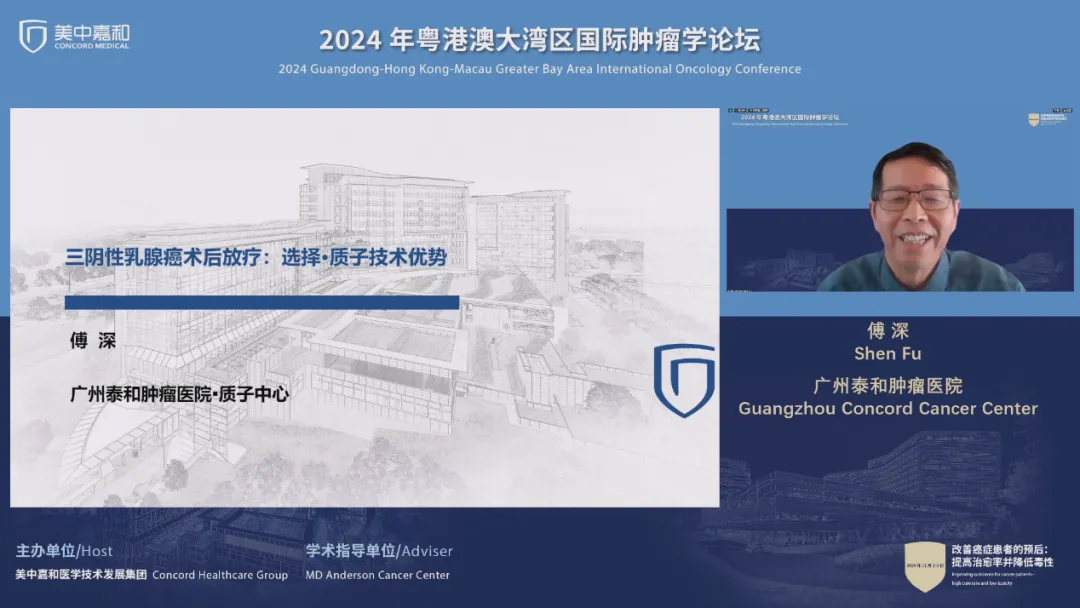
Professor Fu Shen
Professor Fu Shen, Vice President and Director of the Proton Center at Guangzhou Concord Cancer Center, Professor Ajit K. Bisen from MD Anderson Cancer Center, Professor Zhu Li-ling from the Breast Surgery Department at Sun Yat-sen Memorial Hospital of Sun Yat-sen University, Professor Adaeze Nwosu Iheme from MD Anderson Cancer Center, Deputy Director Zhou Minping from the Nursing Department at Guangzhou Concord Cancer Center, Professor Gabriela Mota-George from MD Anderson Cancer Center, and Professor Li Shunrong from Sun Yat-sen Memorial Hospital of Sun Yat-sen University shared academic advancements in the diagnosis, treatment, and nursing of breast cancer.
Professor Ajit K. Bisen introduced the latest diagnostic and treatment strategies for advanced breast cancer. He emphasized that breast cancer treatment has entered the era of personalized medicine, where it is essential to define the patient’s stage and subtype to guide individualized treatment. Early diagnosis and treatment can improve the cure rate of breast cancer, and only through the rational application of surgery, radiotherapy, chemotherapy, endocrine therapy, targeted therapy, immunotherapy, and supportive care can better treatment outcomes be achieved for patients.
For HR+ breast cancer, endocrine therapy remains a crucial treatment option, represented by selective estrogen receptor modulators (SERMs), selective estrogen receptor downregulators (SERDs), aromatase inhibitors (AI), and gonadotropin-releasing hormone (GnRH) agonists. Professor Gabriela Mota-George emphasized the importance of identifying and monitoring common side effects of these drugs, providing timely interventions to ensure the smooth implementation of endocrine therapy.
In the treatment of triple-negative breast cancer, radiotherapy plays a critical clinical role. The choice of radiotherapy needs to consider factors such as cell biology and molecular biology, selecting the appropriate treatment based on the tumor's biological characteristics. Professor Fu Shen highlighted that in the era of precision medicine, precision treatment is also the goal of radiotherapy. Conventional radiotherapy models have encountered limitations, as adverse effects like radiation-induced cardiovascular damage and radiation pneumonitis restrict their use. Proton therapy, as a more precise and less toxic treatment modality, can improve local control rates, enhance overall survival, and minimize early and late adverse reactions. It is expected to preserve organ function, maintain quality of life, reduce unnecessary radiation, and lower the risk of secondary malignancies, offering patients a better prognosis. In future clinical practice, proton radiotherapy will occupy an important role. Guangzhou Concord Cancer Center’s proton radiotherapy system is soon to be clinically applied, promising new treatment options for patients.
The forum also focused on discussing new concepts and strategies in cancer prevention and control, bringing new hope to patients. Professor Maher A. Karam from MD Anderson Cancer Center, Professor Zhang Yingjian, Director of Shanghai Concord Medical Imaging Diagnostic Center, Professor Meroe Morse from MD Anderson Cancer Center, and Professor Fang Cong, Director of the Reproductive Medicine Center at the Sixth Affiliated Hospital of Sun Yat-sen University, participated in this session and shared their insights.
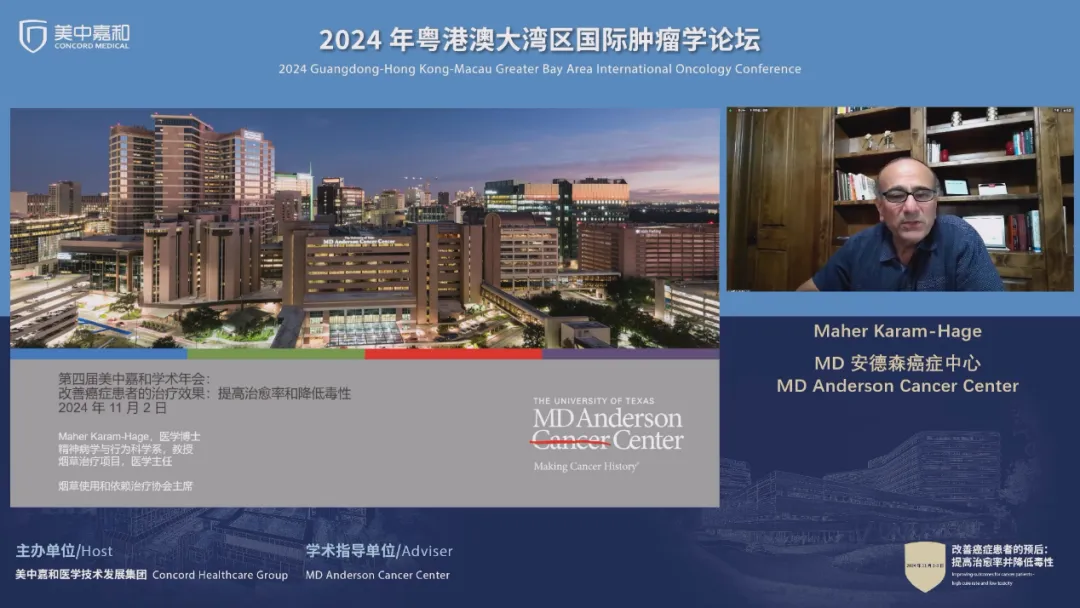
Professor Maher A. Karam
Professor Maher A. Karam pointed out that smoking is a major risk factor for preventable cancer-related deaths. Effective tobacco control can help improve cancer patients' cure rates and reduce toxicity. Research data also supports the positive impact of smoking cessation on cancer patients' survival rates. To better improve the prognosis of cancer patients, smoking control measures must be implemented. Professor Zhang Yingjian shared the latest advancements in tumor imaging diagnostic technologies.
Integrative oncology is a patient-centered approach that provides diagnostic and therapeutic support based on evidence from multiple disciplines. Professor Meroe Morse emphasized that in addition to conventional medical measures, attention should also be given to the patient’s inner world, with a focus on social, psychological, and biological support from multiple angles to promote deeper physical and mental well-being. Professor Fang Cong shared the latest developments in preserving fertility in cancer patients.
Amidst the heated discussions on advanced diagnostic concepts and the application of innovative technologies, the two-day forum successfully concluded. The passionate speeches of both Chinese and international experts not only sparked new ideas among attendees but also deepened the valuable friendships among international colleagues. Over one million viewers attended this high-profile academic exchange.
In his closing speech, Professor Qian Chaonan, President of Guangzhou Concord Cancer Center, stated that the 2024 Guangdong-Hong Kong-Macao Greater Bay Area International Oncology Forum...
